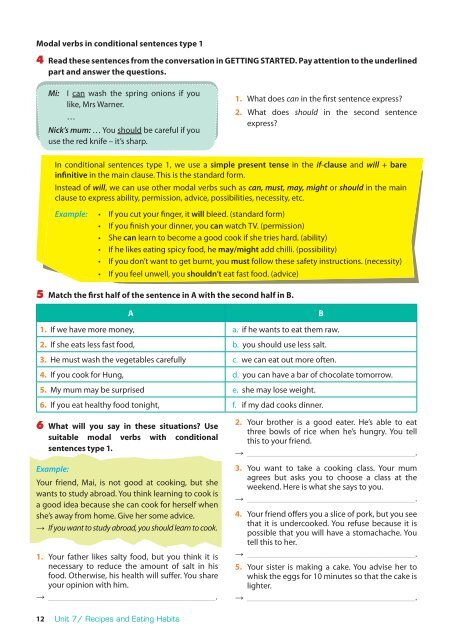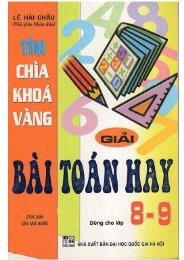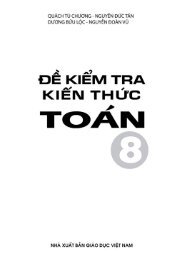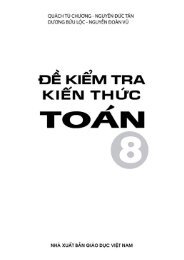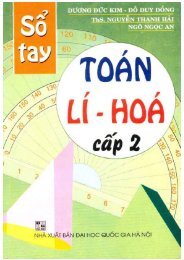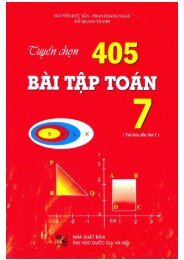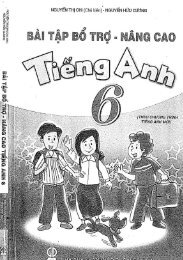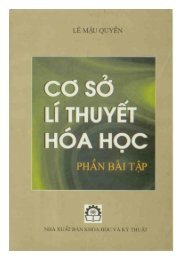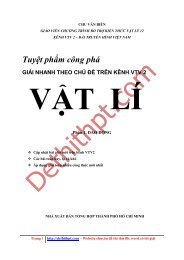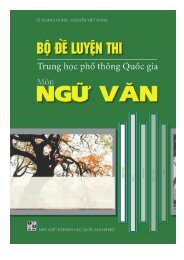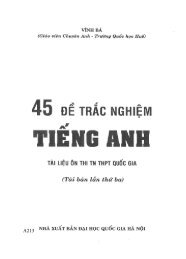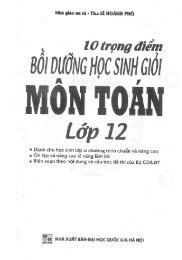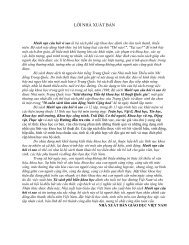Sách giáo viên Tiếng Anh 9 Thí điểm 2 tập (Pilot English 9 for Teacher)
https://app.box.com/s/rnv2yu1duebjhdpkknu2l47p9nmel5ax
https://app.box.com/s/rnv2yu1duebjhdpkknu2l47p9nmel5ax
You also want an ePaper? Increase the reach of your titles
YUMPU automatically turns print PDFs into web optimized ePapers that Google loves.
Modal verbs in conditional sentences type 1<br />
4 Read these sentences from the conversation in GETTING STARTED. Pay attention to the underlined<br />
part and answer the questions.<br />
Mi: I can wash the spring onions if you<br />
like, Mrs Warner.<br />
…<br />
Nick’s mum: … You should be careful if you<br />
use the red knife – it’s sharp.<br />
1. What does can in the first sentence express?<br />
2. What does should in the second sentence<br />
express?<br />
In conditional sentences type 1, we use a simple present tense in the if-clause and will + bare<br />
infinitive in the main clause. This is the standard <strong>for</strong>m.<br />
Instead of will, we can use other modal verbs such as can, must, may, might or should in the main<br />
clause to express ability, permission, advice, possibilities, necessity, etc.<br />
Example: will bleed. (standard <strong>for</strong>m)<br />
can watch TV. (permission)<br />
can learn to become a good cook if she tries hard. (ability)<br />
may/might add chilli. (possibility)<br />
must follow these safety instructions. (necessity)<br />
shouldn’t eat fast food. (advice)<br />
5 Match the first half of the sentence in A with the second half in B.<br />
A<br />
1. If we have more money, a. if he wants to eat them raw.<br />
2. If she eats less fast food, b. you should use less salt.<br />
3. He must wash the vegetables carefully c. we can eat out more often.<br />
4. If you cook <strong>for</strong> Hung, d. you can have a bar of chocolate tomorrow.<br />
5. My mum may be surprised e. she may lose weight.<br />
6. If you eat healthy food tonight, f. if my dad cooks dinner.<br />
B<br />
6 What will you say in these situations? Use<br />
suitable modal verbs with conditional<br />
sentences type 1.<br />
Example:<br />
Your friend, Mai, is not good at cooking, but she<br />
wants to study abroad. You think learning to cook is<br />
a good idea because she can cook <strong>for</strong> herself when<br />
she’s away from home. Give her some advice.<br />
→ If you want to study abroad, you should learn to cook.<br />
1. Your father likes salty food, but you think it is<br />
necessary to reduce the amount of salt in his<br />
food. Otherwise, his health will suffer. You share<br />
your opinion with him.<br />
→ ______________________________________________.<br />
2. Your brother is a good eater. He’s able to eat<br />
three bowls of rice when he’s hungry. You tell<br />
this to your friend.<br />
→ ______________________________________________.<br />
3. You want to take a cooking class. Your mum<br />
agrees but asks you to choose a class at the<br />
weekend. Here is what she says to you.<br />
→ ______________________________________________.<br />
4. Your friend offers you a slice of pork, but you see<br />
that it is undercooked. You refuse because it is<br />
possible that you will have a stomachache. You<br />
tell this to her.<br />
→ ______________________________________________.<br />
5. Your sister is making a cake. You advise her to<br />
whisk the eggs <strong>for</strong> 10 minutes so that the cake is<br />
lighter.<br />
→ ______________________________________________.<br />
12<br />
12 Unit<br />
Unit<br />
7/<br />
7/<br />
Recipes<br />
Recipes<br />
and<br />
and<br />
Eating<br />
Eating<br />
Habits<br />
Habits


